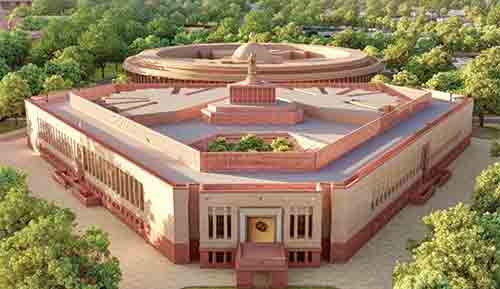 INDIA greets the New Year with a momentous leap into a progressive future, marked by a historic shift in its legal framework. This transformation is encapsulated in President Droupadi Murmu’s recent assent to three ground-breaking Bills, catalysing a legal revolution under the leadership of Prime Minister Narendra Modi.
INDIA greets the New Year with a momentous leap into a progressive future, marked by a historic shift in its legal framework. This transformation is encapsulated in President Droupadi Murmu’s recent assent to three ground-breaking Bills, catalysing a legal revolution under the leadership of Prime Minister Narendra Modi.
The enactment of the Bhartiya Nyaya Sanhita, 2023; Bharatiya Nagarik Suraksha Sanhita, 2023; and Bharatiya Sakshya Bill, 2023, marks a defining moment in India’s legislative history. These Bills, replacing the Indian Penal Code-1860, the Code of Criminal Procedure Act-1898, and the Indian Evidence Act of 1872, symbolise India’s definitive move away from its colonial past, steering towards a legal system that resonates with the ethos of a sovereign nation.
Amit Shah’s initiative The transformative journey of these Bills began with Union Home Minister Amit Shah’s initiative, following extensive consultations with a wide array of stakeholders, including Supreme Court and High Court judges, law universities, Chief Ministers, and Governors. These consultations ensured that the new legislation was not only comprehensive, but also reflective of India’s diverse legal needs and contemporary realities.
Shah, while addressing the Rajya Sabha, underscored the historic significance of these reforms. He articulated a vision where, for the first time, the Indian justice system would be underpinned by legislation framed and passed by Indians themselves. Shah emphasised the integration of technology in legal processes, envisioning a future where justice is not only efficient and transparent but also swiftly delivered within three years of the enactment of these laws. This promise of expeditious justice stands in stark contrast to the oftenprotracted legal proceedings of the past.
A significant aspect of the new legislation is the abolition of the colonial-era sedition India enters New Year with a HISTORIC shift in its legal framework laws. Shah delineated a clear distinction between criticism of the Government, which is no longer punishable, and actions that threaten national sovereignty. This move has been lauded as a step towards safeguarding freedom of expression while maintaining national integrity.

Furthermore, Shah’s poignant criticism of the colonial origin of the replaced laws underscored the Modi Government’s commitment to rectifying historical injustices. The colonial laws, primarily designed to protect British interests, had long been incongruent with the protection and empowerment of Indian citizens. The new legislation, therefore, represents not just a legal overhaul but also an alignment of the legal system with India’s evolving socio-political landscape.
Pressing social issues The new laws redefine the approach to pressing social issues like terrorism and organised crime, introducing more effective definitions and punitive measures.
They also pioneer innovative approaches like community servicing for the reform of criminals and take a firm stand on issues like mob lynching. These changes, alongside fulfilling promises such as the construction of the Ram Temple and implementing 33 per cent reservation for women in Assemblies and Parliament, exemplify the Government’s commitment to its electoral manifesto and the principles of justice rooted in Indian philosophy.
As India steps into this New Year, the legislative reforms represent more than just a legal metamorphosis. They signify a redefinition of India’s identity and a reimagining of its future. This historic moment, a true legal revolution, marks India’s rapid progression into a new era. It reflects the nation’s unwavering commitment to reforming its legal framework, modernising its judicial processes, and firmly leaving behind the shadows of its colonial past.


























